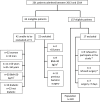Very low-calorie diet in candidates for bariatric surgery: change in body composition during rapid weight loss
- PMID: 30892414
- PMCID: PMC6399661
- DOI: 10.6061/clinics/2019/e560
Very low-calorie diet in candidates for bariatric surgery: change in body composition during rapid weight loss
Abstract
Objective: To analyze the changes in the body composition of morbidly obese patients induced by a very low-calorie diet.
Methods: We evaluated 120 patients selected from a university hospital. Body composition was assessed before and after the diet provided during hospitalization, and changes in weight, body mass index, and neck, waist and hip circumferences were analyzed. Bioimpedance was used to obtain body fat and fat-free mass values. The data were categorized by gender, age, body mass index and diabetes diagnosis.
Results: The patients consumed the diet for 8 days. They presented a 5% weight loss (without significant difference among groups), which represented an 85% reduction in body fat. All changes in body circumference were statistically significant. There was greater weight loss and a greater reduction of body fat in men, but the elderly showed a significantly higher percentage of weight loss and greater reductions in body fat and fat-free mass. Greater reductions in body fat and fat-free mass were also observed in superobese patients. The changes in the diabetic participants did not differ significantly from those of the non-diabetic participants.
Conclusions: The use of a VLCD before bariatric surgery led to a loss of weight at the expense of body fat over a short period, with no significant differences in the alteration of body composition according to gender, age, body mass index and diabetes status.
Conflict of interest statement
No potential conflict of interest was reported.
Figures


Similar articles
-
Body Composition Changes Following a Very-Low-Calorie Pre-Operative Diet in Patients Undergoing Bariatric Surgery.Obes Surg. 2020 Jan;30(1):119-126. doi: 10.1007/s11695-019-04174-y. Obes Surg. 2020. PMID: 31529393 Clinical Trial.
-
Metabolic effects, safety, and acceptability of very low-calorie ketogenic dietetic scheme on candidates for bariatric surgery.Surg Obes Relat Dis. 2018 Jul;14(7):1013-1019. doi: 10.1016/j.soard.2018.03.018. Epub 2018 Mar 21. Surg Obes Relat Dis. 2018. PMID: 29785940
-
Very low-carbohydrate ketogenic diet before bariatric surgery: prospective evaluation of a sequential diet.Obes Surg. 2015 Jan;25(1):64-71. doi: 10.1007/s11695-014-1348-1. Obes Surg. 2015. PMID: 25005809 Clinical Trial.
-
[Diet therapy of severe obesity].Ann Ital Chir. 2005 Sep-Oct;76(5):417-23. Ann Ital Chir. 2005. PMID: 16696214 Review. Italian.
-
Diet approach before and after bariatric surgery.Rev Endocr Metab Disord. 2020 Sep;21(3):297-306. doi: 10.1007/s11154-020-09571-8. Rev Endocr Metab Disord. 2020. PMID: 32734395 Free PMC article. Review.
Cited by
-
Obesity and malnutrition in children and adults: A clinical review.Obes Pillars. 2023 Sep 7;8:100087. doi: 10.1016/j.obpill.2023.100087. eCollection 2023 Dec. Obes Pillars. 2023. PMID: 38125660 Free PMC article. Review.
-
Neck circumference in Latin America and the Caribbean: A systematic review and meta-analysis.Wellcome Open Res. 2021 Jan 26;6:13. doi: 10.12688/wellcomeopenres.16560.1. eCollection 2021. Wellcome Open Res. 2021. PMID: 33954266 Free PMC article.
-
Establishment of Adequate Nutrient Intake Criteria to Achieve Target Weight Loss in Patients Undergoing Bariatric Surgery.Nutrients. 2020 Jun 14;12(6):1774. doi: 10.3390/nu12061774. Nutrients. 2020. PMID: 32545878 Free PMC article.
-
The Impact of Different Nutritional Approaches on Body Composition in People Living with Obesity.Curr Obes Rep. 2025 May 17;14(1):45. doi: 10.1007/s13679-025-00636-w. Curr Obes Rep. 2025. PMID: 40381089 Free PMC article. Review.
-
International expert consensus on surgery for type 2 diabetes mellitus.BMC Endocr Disord. 2025 Jul 1;25(1):151. doi: 10.1186/s12902-025-01961-w. BMC Endocr Disord. 2025. PMID: 40598146 Free PMC article. Review.
References
Publication types
MeSH terms
LinkOut - more resources
Full Text Sources
Medical

